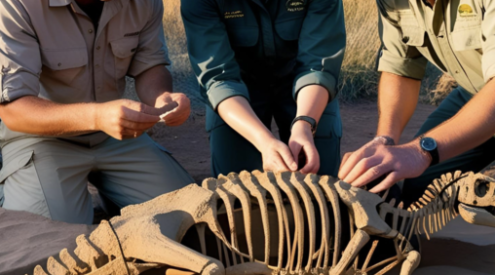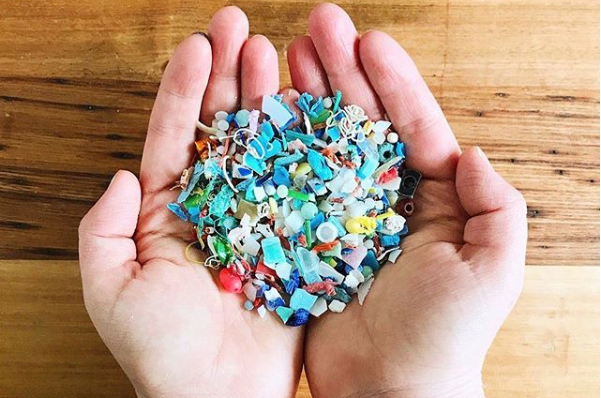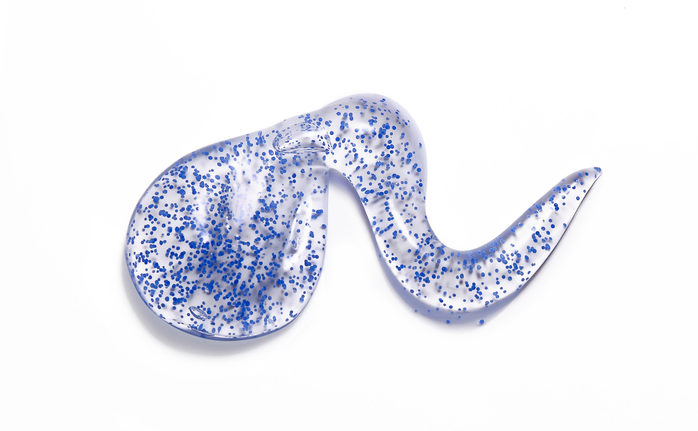While multiple countries around the world move towards reducing plastic usage and pollution by implementing bans on items like plastic bags, single-use plastic products and now microbeads, South Africa, among other nations, is under pressure to target this form of plastic pollution by banning the production, sale and importing of such products.
Plastic pollution poses grave environmental and health risks. In July last year, after microplastics were found to be present in drinking water in the cities of Johannesburg and Tshwane, the National Government announced that they’d be setting up a task team which would look into banning these products.

Microbeads in a gel. Credit: Getty.
Microbeads are solid plastic particles that do not disintegrate and range in sizes from 0.5 to 500 micrometres. They are often round or formless in shape.
Norwegian chemical engineer John Ugelstad developed the polymer technology that made the manufacturing of microbeads possible back in 1976.
The little plastic beads are a very specific type of microplastic and are formed from larger pieces of plastic which are broken down or eroded into smaller and equally dangerous, as well as potentially toxic, pieces.
For decades, microbeads have been manufactured primarily for use in the beauty industry in cosmetics and toiletry products, defined by the United Nations Environment Programme (UNEP) as personal care and cosmetic products (PCCPs).
Microbeads are commonly found in PCCPs such as toothpastes and exfoliating products but extend to items such as shampoos, conditioners, lotions, mascara, and nail polish.
Examples of microbeads include the granule-like particles such as glitter sometimes found in nail polishes and make-up and the small beads found in oral care products and skin exfoliants. These products are referred to as ‘rinse-off cosmetics’ because the microbeads are just washed away.
View this post on Instagram
Here are some of the microplastic polymers that may be found in your everyday personal care products:
- polyethylene
- polypropylene
- polyethylene terephthalate
- polymethyl methacrylate
- polylactic acid
- nylon
Natural and much more eco-friendly alternatives to plastic microbeads include jojoba beads, oatmeal, ground almond, and apricot granules or other non-plastic particulates like lipids and cellulose – look out for these the next time you are buying beauty products and toiletries.
There’s been an ongoing focus on the problem of plastics that have ended up in marine waters, and the South African Water Research Commission (WRC) will be investigating the presence of microplastics in freshwater sources, predominantly in rivers in the North West, Gauteng and the Free State provinces.
View this post on Instagram
Beat the Microbead is an international campaign supported by 97 NGOs and 40 countries and regions. According to the organisation, 448 brands from 119 different manufacturers have promised to remove plastic microbeads from their products. Different countries and regions have banned microplastics to varying degrees, with some banning the manufacturing of products with microbeads in them, to banning imports or sales of such products, while others have been targeting all facets of the plastics’ existence.
Campaigns like Beat the Microbead, and the slowly changing tide as a response to plastics in the environment, could be seen as a sign that countries are heeding the calls of the Basel Convention (1992), which focused on hazardous waste disposal, and the Stockholm Convention (2004), which addressed the issue of persistent organic pollutants (POPs) in the environment.
Countries that have banned microbeads in products include The Netherlands, New Zealand and, most recently, Sweden. The measures ban the import, sale and manufacturing of microbeads as they are found in rinse-off cosmetics. Taiwan is close on their heels but hasn’t entirely banned the sale of rinse-off cosmetics.
It remains to be seen how soon South Africa and other nations will act to ban microbeads in personal care and cosmetic products.
Featured image: Screenshot/Instagram/@couraveg




















